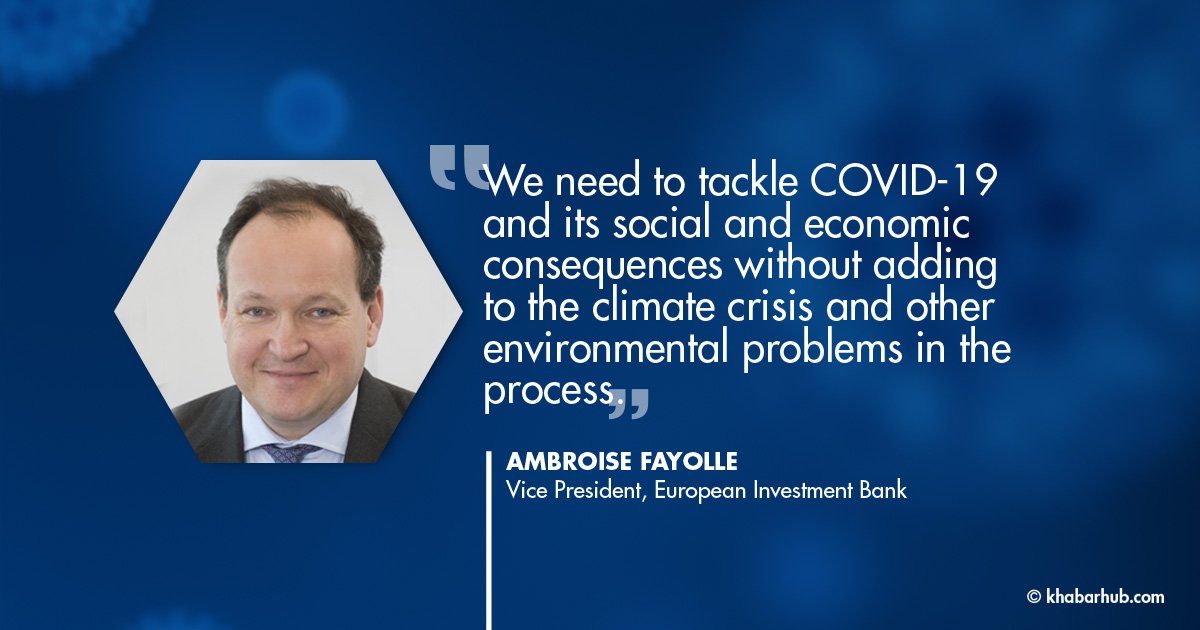For many populists, the jury is still out on climate science, and global warming is a myth, a fabrication, or a hoax.
But most citizens recognize that the scientific findings are sound, and that the threat of climate change is real. And as the European Investment Bank’s new Climate Survey shows, people are demanding climate action.
In Europe, 75% of citizens say that climate change is already having an impact on their everyday lives. In China, the figure is 94%; and even in the United States, 72% of respondents report feeling the effects of climate change.
Of course, the elephant in the room is the COVID-19 pandemic, which is still taking a massive toll in human lives and livelihoods.
The survey finds that while climate change was the highest priority for Europeans in 2019, it has since slipped behind COVID-19 and the unemployment and financial crises the pandemic has caused.
Moreover, the unanimous decision sends another strong signal that the EU is serious about tackling climate change, and wants to pave the way for others to follow.
This is understandable, given the immediacy and severity of the COVID-19 crisis. Nonetheless, the public and policymakers must not lose sight of the greatest long-term challenge humanity faces.
We need to tackle COVID-19 and its social and economic consequences without adding to the climate crisis and other environmental problems in the process.
In fact, these two issues are related. Both threats show that we need to build more resilience into the economic system. This realization is not lost on the public. The EIB survey finds that a majority of Europeans want a green recovery as we build back our economies.
Five years after it was concluded, the Paris climate agreement’s emissions-reduction targets remain within reach.
The EU, China, Japan, and South Korea have all pledged to become climate-neutral by mid-century or soon thereafter, and will be joined by the US under its new leadership.
Together, these economies account for two-thirds of global GDP and over 50% of total greenhouse-gas emissions.
But pledging is not enough. We now need more countries, cities, businesses, and financial institutions to lead by example, not merely discussing concrete decarbonization plans, but actually implementing them.
We also need to follow through on “greening” the global financial system by establishing common standards, definitions, and disclosure requirements to channel the power of finance toward a more sustainable future.
In addition, the EIB will adhere to a shadow carbon price that will increase to €250 per ton by 2030, and to €800 per ton by 2050. This will strengthen the economic case for projects that save carbon and penalize those that increase emissions.
As a longtime climate leader, the EIB is the world’s largest multilateral lender for climate action projects. Last month, our shareholders – the 27 European Union member states – unanimously approved the EIB Group Climate Bank Roadmap for 2021-2025. This plan will guide our activities in the next five years and beyond.
Moreover, the unanimous decision sends another strong signal that the EU is serious about tackling climate change, and wants to pave the way for others to follow.
And it reinforces the key role that the EIB Group intends to play to support the implementation of the European Green Deal and the Sustainable Development Goals (SDGs) around the world.
The roadmap focuses on four areas. First, by the end of this decade, the EIB Group aims to support at least €1 trillion ($1.2 trillion) in investment in climate action and environmental sustainability.
By 2025, more than 50% of EIB financing will go to such projects, up from around 30% today. Our aim is to accelerate the “green transition” and to facilitate widespread participation from the private sector.
Second, we will support a “just transition” for the regions, communities, and businesses most vulnerable to the shift to a low-carbon economy and to the adverse effects of a changing climate.
Third, by the end of this year, we will be the world’s first multilateral development bank to align all new operations with the objectives of the Paris agreement.
Within the EU, this means that we will be aligned with a 1.5ºC cap on global warming (relative to the preindustrial level) and a pathway to climate neutrality by 2050.
But no institution or group of institutions can tackle climate change on its own. All of our partners must become global climate leaders. When it comes to charting a course to climate security, the more roadmaps the better.
For example, we will no longer support unabated fossil-fuel energy, carbon-intensive agricultural activities, or airport expansions.
In addition, the EIB will adhere to a shadow carbon price that will increase to €250 per ton by 2030, and to €800 per ton by 2050. This will strengthen the economic case for projects that save carbon and penalize those that increase emissions.
Fourth, as the pioneer of green bonds, we understand that transparency and accountability are key to mobilizing sustainable finance at scale. We will continue to help develop the EU taxonomy for green investments and the EU Green Bond Standard. By helping to prevent greenwashing, our work makes green finance more attractive to private investors.
The new Climate Bank Roadmap is a milestone for the EU and the wider world. It is highly encouraging that at the recent Finance in Common Summit, 450 development banks from around the world pledged to support the Paris agreement and the Sustainable Development Goals.
Together, these banks invest around $2.3 trillion – 10% of global public and private investment – annually.
But no institution or group of institutions can tackle climate change on its own. All of our partners must become global climate leaders. When it comes to charting a course to climate security, the more roadmaps the better.
(Ambroise Fayolle is Vice President of the European Investment Bank)
Copyright: Project Syndicate, 2020









Comment